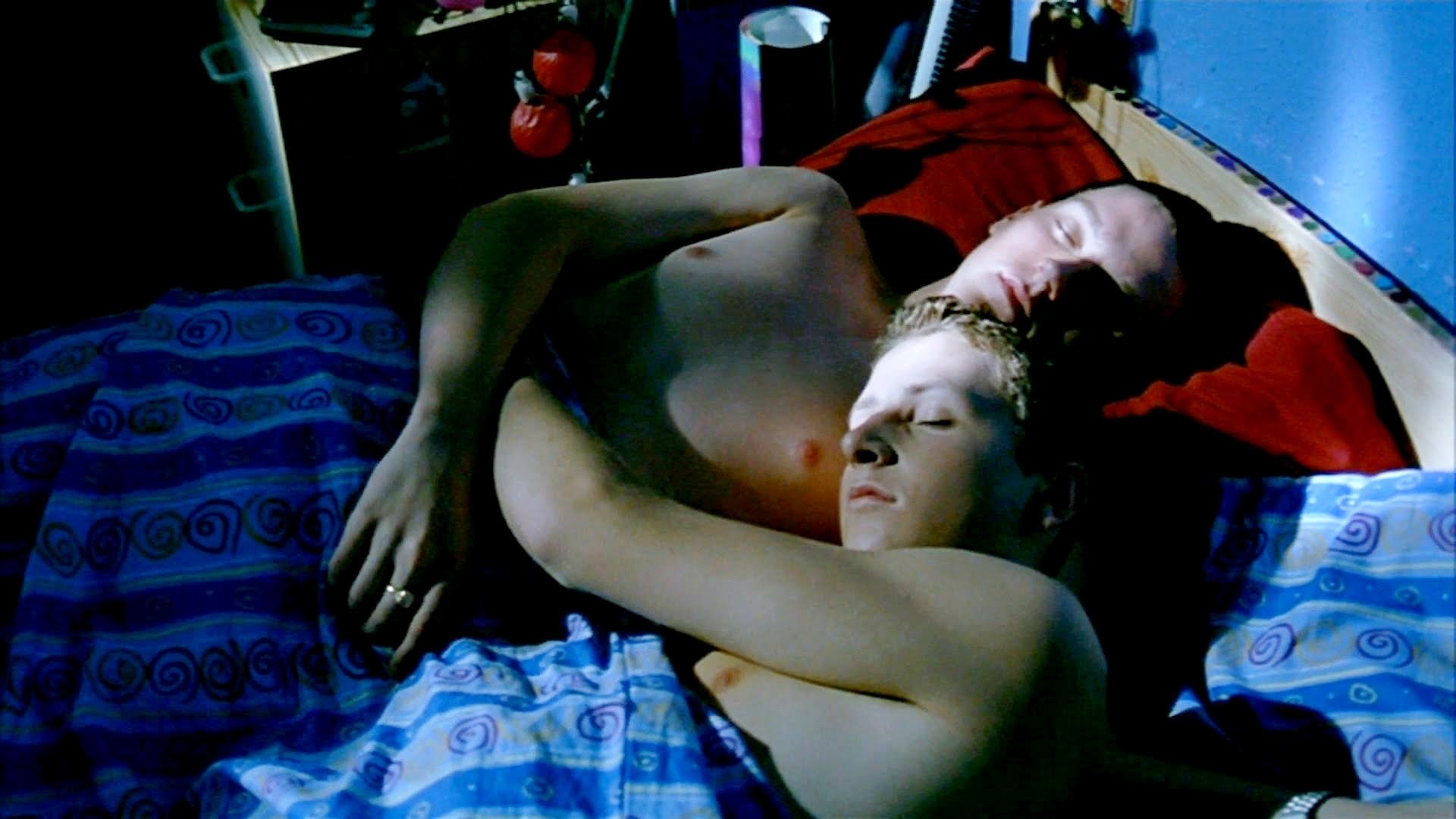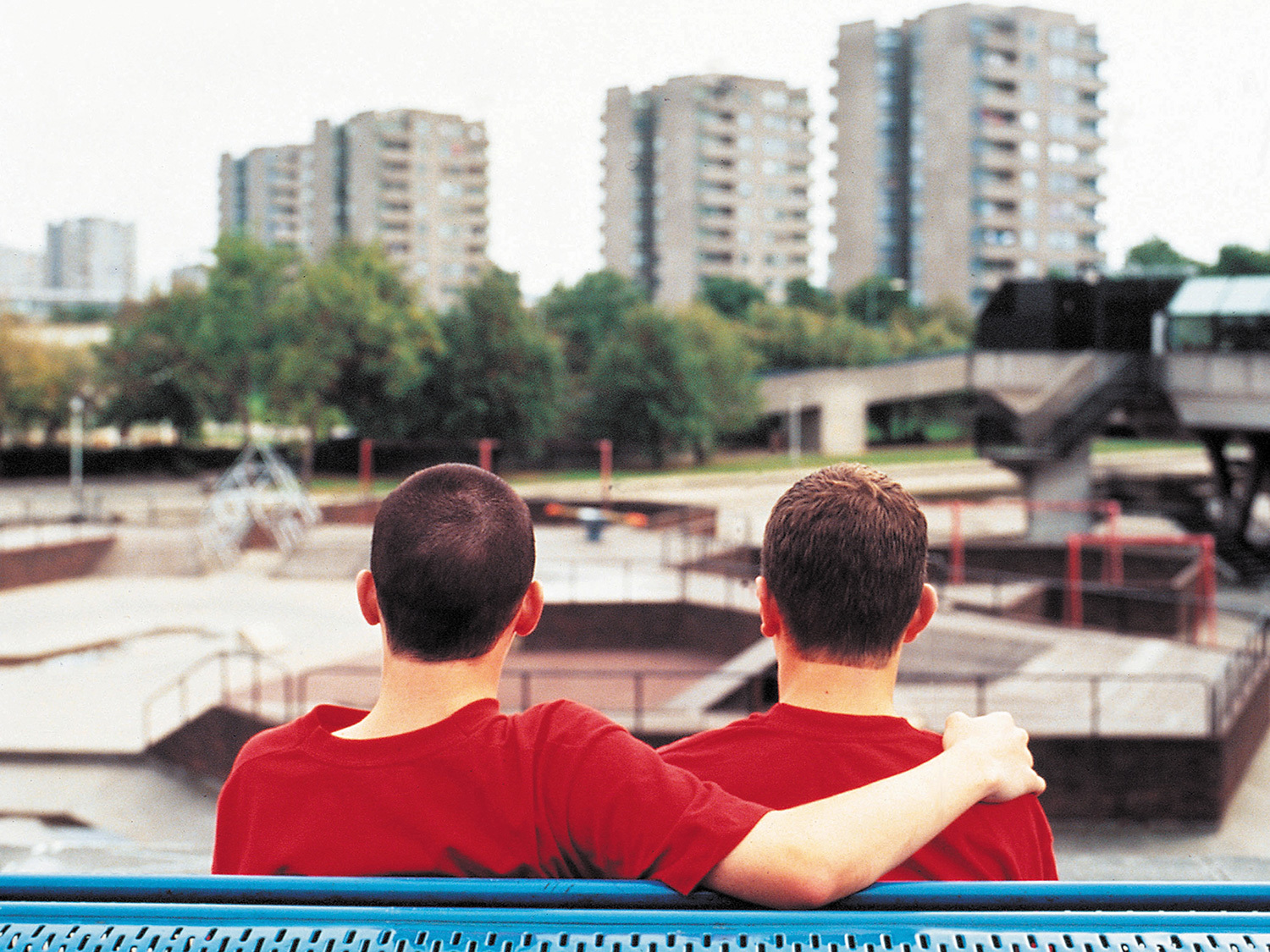Seminal is a horribly over-used word, but it genuinely applies to Beautiful Thing. Jonathan Harvey’s play about two gay teenagers falling in love on a south London housing estate touched many when it debuted at the Bush Theatre in 1993, and continued to move people when it transferred to the West End the following year. The film version, which premiered 20 years ago this week, has comforted countless LGBT people over the years with its warm, empathetic and hopeful depiction of young love between sweet but picked-on Jamie and his closed-off classmate Ste. To mark the film’s anniversary, we spoke to Harvey, now a seasoned TV writer and novelist too, about the story’s enduring appeal.
Were you pleased when Film 4 said they wanted to make the play into a film? Or a bit suspicious?
No, it was something I wanted from the word go. My agent got me in to see Film4 before the play had been on – they’d read the play script and liked it. Originally they said to me, “You can obviously write, have you ever thought about writing a short film?” And I rather arrogantly said, “I’m not really interested in doing that.” So we parted company. But then when the play was a success, they did a volte-face and got back in touch and said, “We’d like to make it.” But yeah, I was always completely up for it.
What were the major challenges of adapting the play for the cinema?
The main challenge, really, was that I was very young and had never done it before. But a play is very much a talky thing – you’re looking at a black box with things happening in it and the story is being told through people speaking. With a screenplay, it’s sort of show, don’t tell. I could write 20 lines of dialogue about someone fancying someone but you can see that in one look in the cinema. So it was about knowing which bits to let go, and which bits to keep. The play was very claustrophobic – it was set just in a bedroom and on this little walkway outside the flats. So it was about knowing at which points in the story to take flight from there and go somewhere else. At first [when I was adapting the play], I left that block of flats too easily. I remember it felt like a very long, very boring episode of Grange Hill where someone comes out. But the good thing is they got Hettie MacDonald to direct the film. She’d directed all three productions of the play and felt the only way it would work is if I reined it in and made it as similar to the play as possible. Because it’s really a story about two people falling in love; there are no massive car chases or shoot-outs or anything.

Why do you think Beautiful Thing has endured so much? Watching the film has kind of become a rite of passage for young gay people.
I really don’t know, and that’s not false naivety or false modesty. I would have thought by now there would have been another equally successful play about what it’s like to be young and gay. Beautiful Thing is a museum piece now in lots of ways. These boys are falling in love at a time when no one has a mobile phone and there’s no such thing as the internet; we’re in a completely different world now. I think when I first tried to analyse why the play was successful, I thought it was maybe because there’s a universality to it – you can enjoy it even if you’re not gay. That thing about first love and fancying someone and making the first move and having them reciprocate, and it sort of all being OK, I think that’s something people like to see. You don’t always want it to be bleak. I wrote it in 1992 at a period when plays about the gay experience – and rightly so – had a massive vein of reckless tragedy to them because of the AIDS pandemic. So I wanted to tell a story that was different, that was more uplifting and funnier. Maybe that’s been it’s enduring thing – there’s an optimism to it.
And even now, it’s rare to see a story about two young gay people falling in love. Well, the reason I wrote it in the first place was in response to Clause 28 – Thatcher’s policy about not being able to promote homosexuality in schools. I was a school teacher at the time and it was just an awful regime to be working under. When I heard homosexuality being discussed in the House of Lords because they were considering lowering the age of consent from 21 to 18, it was all about “sodomy” and “buggery” – those were the words being used. There was nothing about falling in love or emotions, so that was also why I wrote Beautiful Thing. It was quite political with a small “p”. But that shouldn’t account for its enduring appeal, should it? It should just have been a semi-angry response to a moment in time, which is why it’s always confounded me when I get a phone call from my agent saying another theatre wants to put it on or there’s a 20th anniversary screening of the film coming up. I mean, I’m sure there are loads of bloody old queens like me who remember seeing it when they were 20 and still have a soft spot for it. So maybe it’s a sentimental thing, as well.
Twenty years since the film came out, do you think representation of LGBT people on film and TV has improved much?
Yeah, it’s got a lot better but I’ve sort of given up pitching gay ideas to the TV channels. Because it’s like when Film4 decided to do Beautiful Thing, that meant they weren’t going to do anything else “gay” that year. And so I think what’s changed is the commissioners have got better at not sounding homophobic when they turn things down. So they won’t say, “It’s a bit gay”; they’ll say, “Well that was very cosmopolitan.” And you just know it’s because they’ve just decided to make another gay drama or they just can’t be arsed to do a gay drama. You know, writer friends of mine who are Asian have said, “They’re not going to make my thing this year because they’re already making blah blah blah.” So t’was ever thus. But I do think it’s certainly better than it was us. We have the odd drama [on TV] where gay people are centre-stage like London Spy and Cucumber, but I can’t think of anything else in the last 18 months that was really gay-centric. Obviously soap operas do their best to keep the momentum going with LGBT characters too. It could be better, but I’m sure any minority group, as we’re known, would feel the same way.
What are the gay stories that need to be told in 2016?
You write about your experiences of life and 20 years on, I don’t know what those stories are now, so I don’t feel like I can dictate that. But I bet you some fabulous 24-year-old writer who’s out there could. I’ve been hearing about chemsex parties and slamming, so maybe that’s something people should be writing about. But somebody else – somebody younger who’s actually experienced it – should be writing about the chemsex scene because I don’t really understand it. I’m sounding like a lazy bastard now, aren’t I?
Credits
Text Nick Levine
Stills from Beautiful Thing
